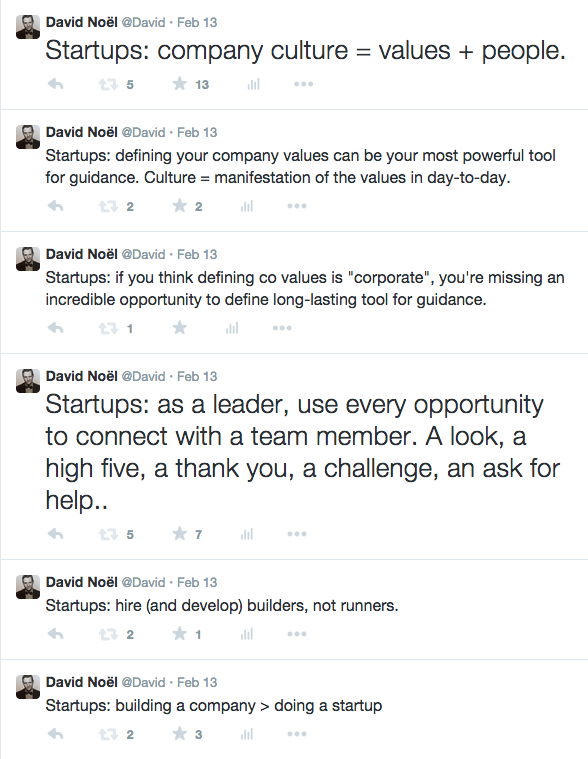Five things I've learned in six years at SoundCloud
- Transfer
 A few weeks ago, I started writing on Twitter. It was a shaft of ideas, insights and lessons that I received over six years of work at SoundCloud, helping the startup to become the largest sound and music platform on the network.
A few weeks ago, I started writing on Twitter. It was a shaft of ideas, insights and lessons that I received over six years of work at SoundCloud, helping the startup to become the largest sound and music platform on the network. I dropped out of college, sang in a hardcore group, was engaged in tourists, marketing and founded unsuccessful enterprises. Joining SoundCloud was one of the highlights of my life. I learned a lot.
After 20 tweets and 2 hours, I wanted to expand to describe all these thoughts. It’s hard to describe ideas, transfer them to paper and hope that others will like them. Today I will try to do it.

5 things I want to talk about in more detail.
1. Corporate culture = a collective of people living with similar values
Culture is the sum of people who daily carry the core values of the company throughout their lives, multiplied by the way these values are transferred within and outside the company.
The definition of values began as an interesting task, and turned into a unique opportunity. At first, we met internal resistance - people didn’t want us to choose a set of meaningless phrases and become “too corporate”. It was important for us to show the whole team the meaning of these values and turn the process into a common cause. Having defined our values, we learned a valuable lesson: the importance of communication within the team and the inclusion of values in the work. They should form a working platform, guide the decision-making process, and they should also become tools for motivating work within our culture. Truly, you begin to love the values of the company when you see what effect they have on the culture of the company.
When I ask people what they like about our company, then usually everyone answers - "people." For many of us, working at SoundCloud means working with the smartest, most passionate, and sweetest people.
The second most popular answer is the results of the company. Development, creation and support of great products for musicians, musicians and listeners. We determine the future of the music industry, product and community of creators and listeners.
The third most popular answer is our values. Openness, an opportunity for personal growth, opportunities for learning and teaching, interesting tasks and independence with autonomy.
At the beginning of the work, the founders Alex and Eric believed that they create an excellent product. Then they realized that they were creating an excellent company creating an excellent product. And finally, they realized that the most important thing was to create a culture that allowed us to create an excellent company creating an excellent product.
Culture is stronger than nishtyakov. Culture is a daily manifestation of your values. What culture suits you and how to create it?
2. In case of confusion - communicate as much as possible
When work is fast, and also in several time zones, the main thing is clarity and repetition. Clarity creates context for information, for setting goals, and for matching the overall picture - for example, the vision and mission of your company.
At the beginning of 2014, we decided to try to express as accurately as possible the main areas of our company’s activities. We reduced our goals to three priorities and tried to convey this to all members of the company. When people began to come up to me with questions like: “Why are we repeating this, we already heard this,” I realized that the system was working.
Direct communication in our company is associated with one of our key values - openness. We believe that this allows you to achieve the best results, that the information should be an underwater stream, increasing speed. This is especially important for a company working for 4 offices in four different time zones.
Communication also helps create context so that people in the company can make decisions that help them build SoundCloud as a product and as a company.
Communication also helps to learn from mistakes and successes - many teams keep journals, documenting acquired knowledge and describing why something went wrong or wrong.
3. Human Resources - More Than Just HR
And of all the lessons described, this is the biggest for me. My experience has always told me that the HR department should be treated as an auxiliary one, which deals with salaries and receiving complaints. I was wrong. Watching how our HR department grew from scratch to a multifunctional international team of business partners, employer partners, services, office management and internal communications, I was amazed. It was one of the most striking and instructive experiences in six years.
We consider the company a community, and we have built our HR department as a team that helps to take care of the community and grow it. Putting people first, and considering them as business partners, first of all following philosophical principles, and only then - business processes, and making the organization’s health a priority, it seems to me that we have built a team that is able to work in the best way and positively influence on all our employees, starting from the moment of communication with the candidates and ending with the moment when they leave us for their further achievements.
4. Hire (and grow) builders, not managers
One of the positive qualities of my colleagues is initiative, the desire to take a step forward, take responsibility and follow everything to the end.
In a startup, when some things are not yet developed, the processes are not in place, this means that the person did not have time to find a suitable solution. Creating an environment for collaboration, where people take responsibility and share it with others, is what makes a startup more attractive than working for a large corporation.
At some point, people begin to “manage” units. And before that, you need builders and workers - those who quickly identify problems and work to solve them.
The best resumes are not those that focus on past accomplishments, but those that describe the requirements for the role that people want to play in the future. This makes you a builder, not a manager, who simply demonstrates a long list of achievements that are irrelevant.
5. Building a company is more than a startup
Sketching a product over the weekend, joining a startup in youth is an emotional roller coaster of a startup culture. All this is wonderful and you have to try. But the real feeling is to watch how the company grows up and turns from a startup to a self-supporting structure, where people come and do what they can in the best way.
Startups are cool. Startups are devastating. But among the splendor of startups and their twenty-year-old founders, there is a moment in life when you start to like the construction of a self-supporting company most of all. The company responsible for its employees, customers, owners and partners.
It’s good that nowadays you can practically connect to open technologies and create mobile applications from the bedroom. It’s more interesting for me to create a healthy corporate culture within the framework of a self-supporting company.
